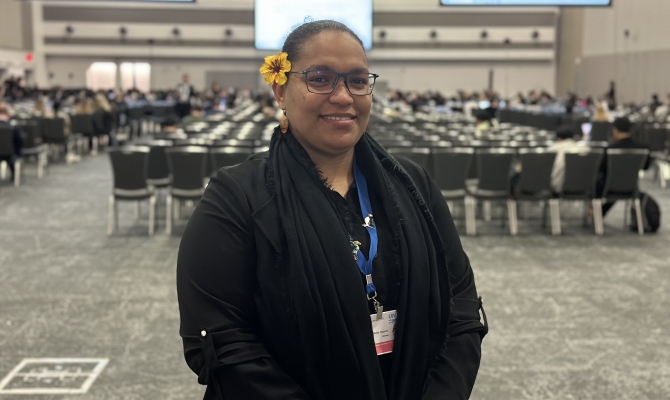
Negotiating a Legally Binding Instrument on Plastic Pollution including in the Marine Environment
29 April 2024, Ottawa Canada - Stepping into deep shoes at the Plastics Treaty now underway, this Pacific Islands women negotiator is showing she can run fast and plans to run far. Ms. Marjorie Wells of Vanuatu is the lead coordinator of the Pacific Small Islands Developing States at the Plastics Treaty negotiations having taken on this role since January this year.
Known as the Intergovernmental Negotiations Committee to develop a legally binding agreement on plastic pollution including in the marine environment, it has united over 170 member states in the spirit of compromise. The Pacific Small Islands Developing States are working together in a unified negotiations approach coordinated by Vanuatu, the Chair of PSIDS. His Excellency, Ambassador Odo Tevi is leading the PSIDS Chair with the support of Marjorie, the PSIDS Oceans coordinator.
After graduating with her Bachelor of Laws in 2015, Ms. Wells joined the Treaties and Conventions Division under the Department of Foreign Affairs and International Cooperation of the Government of Vanuatu as her interest has always been in International Law. Marjorie has then been posted to the Permanent Mission of the Republic of Vanuatu to the United Nations in New York since September of 2023, as the First Secretary to the Mission.
“As soon as I was given the responsibility as Pacific SIDS leads coordinator for the INC I had to step up, fortunately I have a whole team of people behind me for which I am very and humble and grateful for,” said Marjorie.
As the Pacific SIDS Chair, she coordinates the crew of 14 Pacific Islands delegations who work together to raise their voice at the INC negotiations where there is an agreed approach forward. The PSIDS are also members of the Alliance of Small Islands States of 39 member states which is chaired by Samoa and negotiates as such in the INC when there are unified positions.
“In this role as PSIDS Chair I don’t represent Vanuatu, I represent our group. As such I listen to them all and we find a way forward, together. We are stronger, and louder, as one. To help find our unified approach, communication is key. There is a misconception that all our Pacific islands are the same, yet we are not. We’re all individual countries with very real differences but together we find a solution and progress as one– it is our Pacific Way.”
Over the past seven months Marjorie has grown into her negotiation’s role. She has since represented Vanuatu at the table for two main Committees under the General Assembly of the United Nation, the Third Committee on Social, Humanitarian and Cultural and Sixth Committee on legal matters as well as the Open-Ended Working Group on Information and Communication Technologies and now the INC on plastic pollution.
While new-ish in the negotiation platform, she has been active. Ms. Wells make she undertakes thorough research before forming an intervention with her wider team and the national ministry responsible for that area. She makes sure that all her country’s priorities are correct and shares all points for review with the relevant national teams.
“For me doing this work - it's everything I’ve ever dreamed of doing. It’s a great yet a humble feeling to know that now I’m in the middle of this and undertaking negotiations at the international level, and very grateful that I am supported by an excellent team of people,” said Marjorie.
“Yes, I was nervous the first time I took the floor in negotiations, but I knew that our team worked hard together on our national intervention and that it covered all of Vanuatu’s priorities and needs. It was that which gave me the confidence to speak for my country – we had to have a voice and it had to be represented.”
Still learning new lessons today, Marjorie is keen to share them with other Pacific Islands women negotiators to encourage them to take up this role when the opportunity presents itself. She values solid and clear communication as a negotiator and often seeks advice from the more experienced when needed recommending others be open to taking guidance and advice from those willing to share all they have learnt based upon their experiences.
“I always put my ego aside before I start working on negotiations. I ensure my research is done, communicate with my group because we are a team – I do not work alone, I must acknowledge that – we always work as a team,” said Marjorie.
“And while I feel like yes, I am quite new to international negotiations, and am new to being a PSIDS Chair here at the INC4 and a negotiator that sits at the table for Vanuatu, plastic pollution is an issue that is very real for Vanuatu and the region. Every piece of plastic not produced is a step towards a cleaner and sustainable future for generations to come, so it is everybody’s business to make sure we speak for our people, nation and region.”
The fourth Intergovernmental Negotiating Committee to develop an international legally binding instrument on plastic pollution, including in the marine environment is taking place in Ottawa, Canada, from 23-29 April 2024.
The Pacific Islands are represented by the Cook Islands, Federated States of Micronesia, Fiji, Kiribati, Marshall Islands, Nauru, Niue, Palau, Papua New Guinea, Samoa, Solomon Islands, Tonga, Tuvalu and Vanuatu through the support of the Government of Australia and the United Nations.
They are supported by the Secretariat of the Pacific Regional Environment Programme (SPREP), working with partners the Pacific Islands Forum Secretariat (PIFS), Office of the Pacific Ocean Commissioner (OPOC), The Pacific Community (SPC), Forum Fisheries Agency (FFA), Environmental Investigation Agency (EIA), Centre for International Environmental Law (CIEL), University of Wollongong, WWF and Massey University.
For more information visit: https://www.unep.org/inc-plastic-pollution/session-4